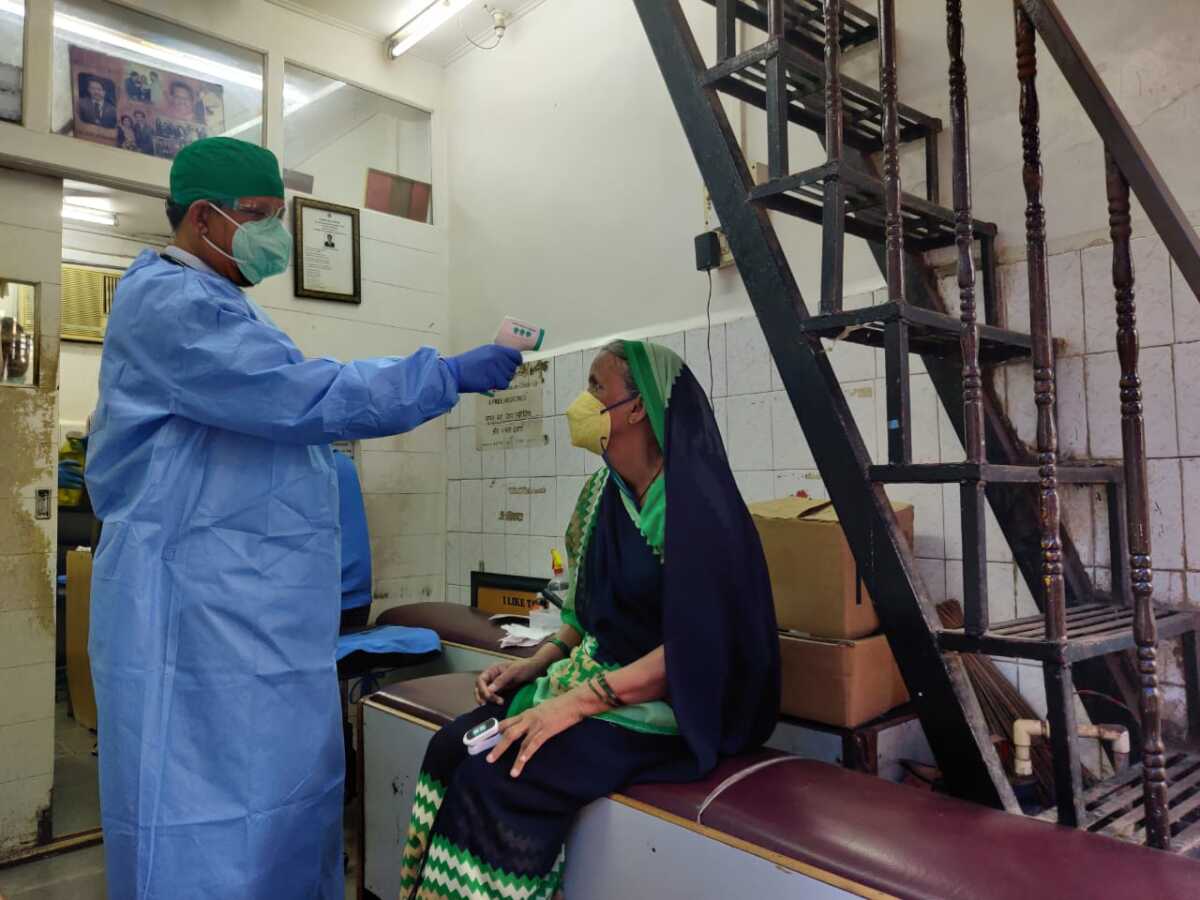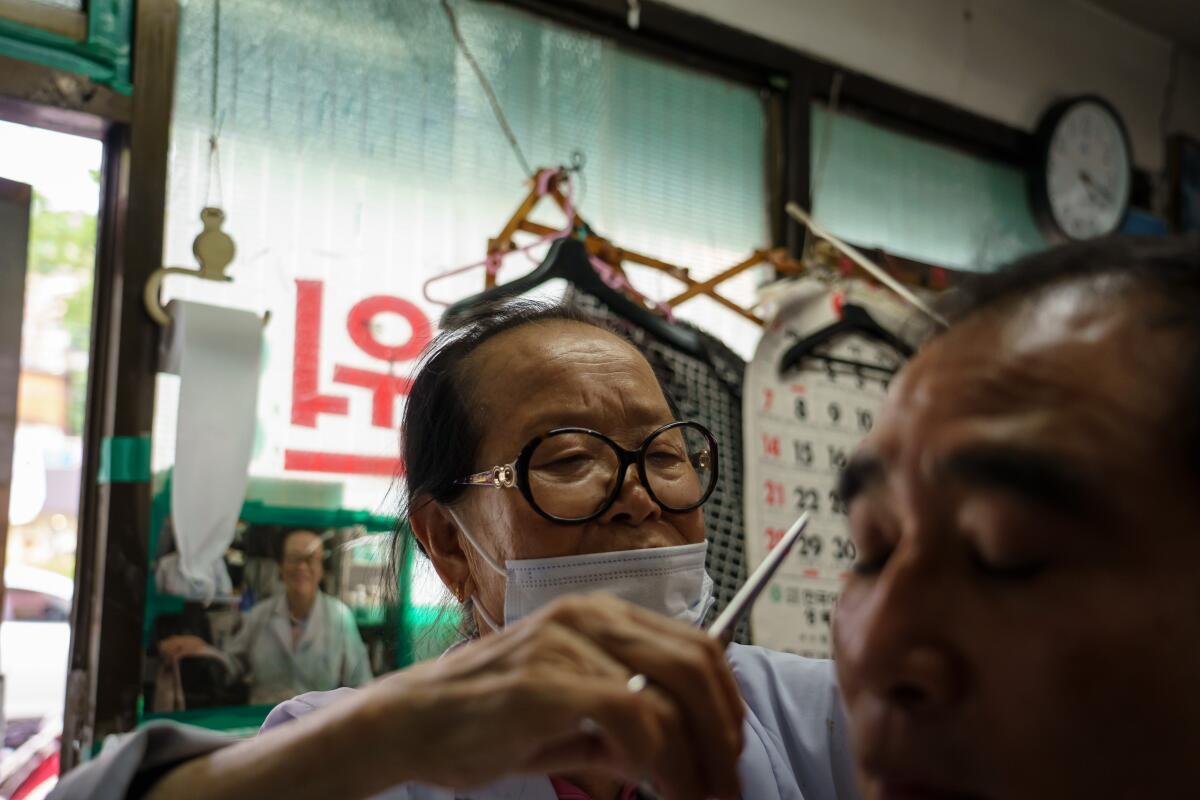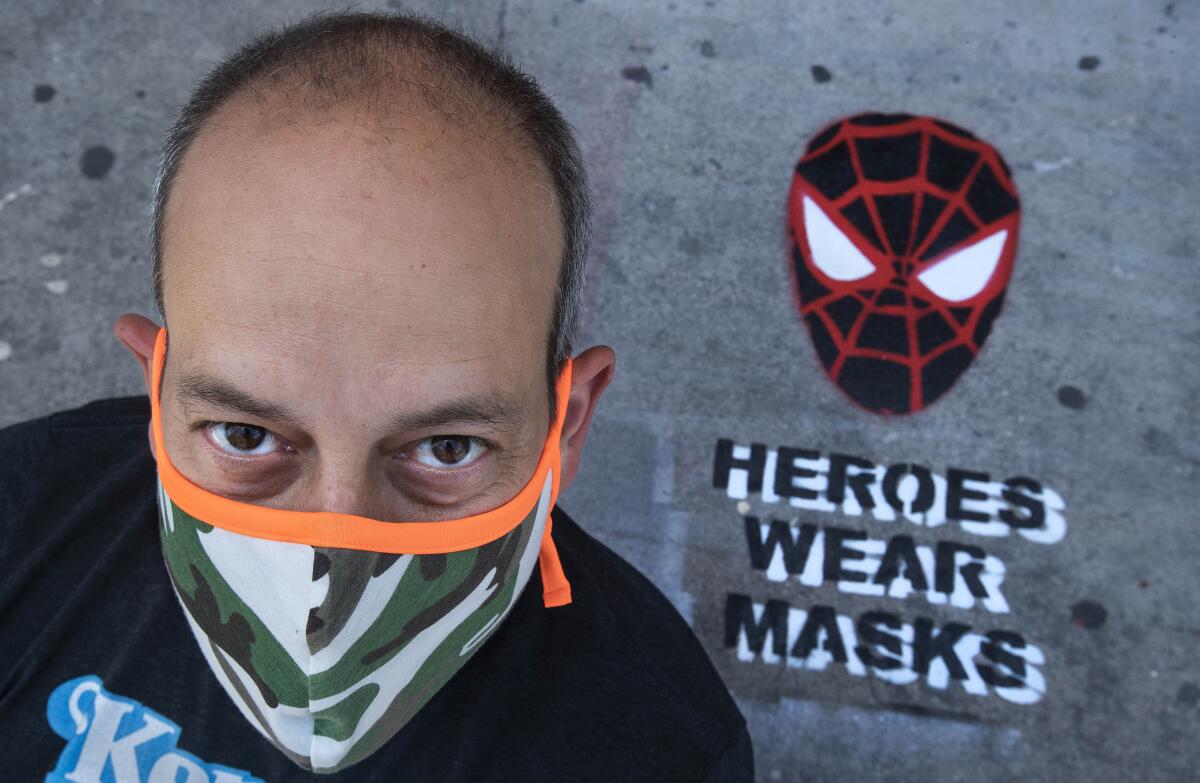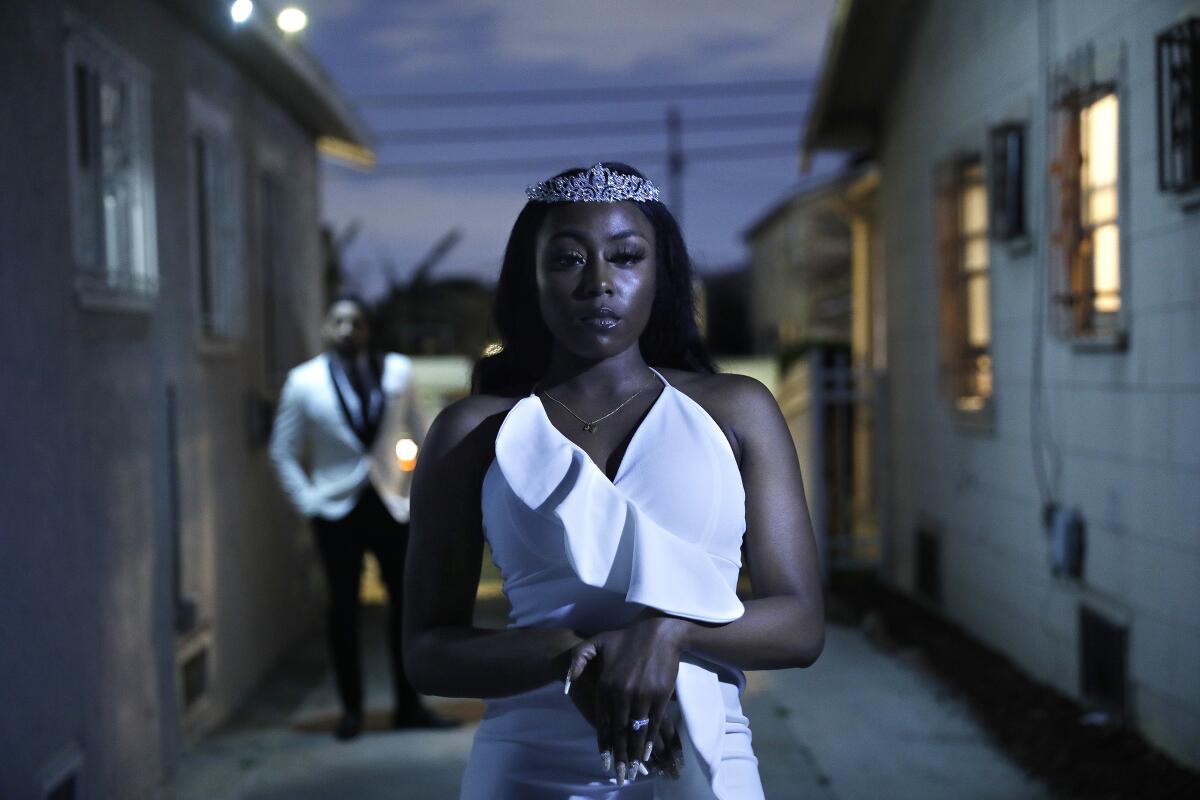Coronavirus Today: Rethinking how we reopen
- Share via
Good evening. We’re Diya Chacko and Sam Schulz, and it’s Friday, June 26. Here’s the latest on what’s happening with the coronavirus, plus ways to spend your weekend and a look at some of the week’s best stories.
Imperial County is so overwhelmed by the coronavirus that state health officials want it to reimpose a strict stay-at-home order. Hospitals in San Bernardino County are starting to reach “surge capacity” as new cases keep climbing. And San Francisco is pausing its reopening as infection rates there spike; hair salons, zoos, outdoor bars and swimming pools won’t open Monday as planned.
On Friday, a day after California surpassed 200,000 coronavirus cases, Gov. Gavin Newsom said the state had paused issuing any new guidelines to let counties accelerate reopening their economies and easing restrictions. The shift comes as the state continues to report a surge in new infections that officials now say cannot be explained by increased testing alone.
Driving that surge is the growing number of young people getting sick. The virus appears to be spreading more in younger age groups now, officials say. As of Wednesday, 56% of Californians diagnosed with COVID-19 were 18 to 49 years old, though they account for only 43.5% of the state’s population. That figure has risen consistently throughout the outbreak but spiked in recent weeks. In L.A. County, 40% of known coronavirus cases are occurring among those 18 to 40 years old.
The trend is being seen beyond California as well: Across the country, the median age of people diagnosed with COVID-19 is 48, according to the Centers for Disease Control and Prevention. And although older adults are at higher risk of developing severe cases, recent data from across the U.S. shows that younger people should not assume they will be spared — a warning underscored by the CDC’s newly updated list of who’s at highest risk.
As California pressed pause, two other states where infections are rising dramatically, threatening to swamp hospitals, saw even sharper policy reversals. The Republican governors of Florida and Texas have rolled back their aggressive reopening plans, which President Trump had touted as successful national models, and have ordered bars to close and restaurants to reduce capacity. With more than 8,900 new cases in Florida on Friday alone — up sharply from the previous single-day record set Wednesday — columnist Michael Hiltzik faults its governor, saying he “turned the battle against COVID-19 into a political issue.”
Even where the reopening has continued apace, the pain inflicted on workers remains stark. The wealthy pulled back sharply on spending when the pandemic first hit and have been slow to ramp back up, new research shows — posing a particular threat to manicurists, dog walkers and other low-wage workers who were barely getting by before. Many of California’s newly jobless still can’t get their unemployment claims approved, prompting lawmakers to demand an audit of the agency. And the Trump administration has asked the Supreme Court to strike down the Affordable Care Act, which hundreds of thousands of laid-off Americans have turned to for health insurance during the pandemic.
For more on how the pandemic is shaping our work and our economy, and on how you can cope, subscribe to our Business team’s newsletter. A recent edition delved into what you should know about keeping yourself safe at work.
By the numbers
California cases and deaths as of 5 p.m. PDT Friday:

Track the latest numbers and how they break down in California with our graphics.
What to read this weekend
An Indian slum has become an unlikely COVID-19 success story. Social distancing is impossible in Dharavi, a labyrinth of one-room shacks in Mumbai that’s best known as the setting for the film “Slumdog Millionaire.” But it appears to have pulled off a miracle. How it happened — a story of dogged legwork, proactive thinking and bravery by officials, doctors and volunteers — could offer lessons in managing the coronavirus for other poor, densely packed communities around the world.

His plane-disinfecting invention didn’t take off. Then COVID-19 hit. Seven years before the pandemic, a Los Angeles orthopedic surgeon invented a contraption in his basement to quickly disinfect an airplane cabin using ultraviolet light. But at the many aviation trade shows and conferences he attended to pitch his invention, few showed interest, until recently.
South Korea’s first woman barber has kept clipping away through a dictatorship, a coup, democratization, a woman’s rise to president and subsequent impeachment — and now even the coronavirus outbreak. “I just need my regulars,” says Lee Duk-hoon, who is 85. “It’s not like I’ll be taking anything with me when I go.”

Devastated by COVID-19, one family member at a time. It had been five years since the Kim family had lived together in their Koreatown apartment. The coronavirus shutdown brought them all back home — but then one by one, members of the family began to contract the disease.
Heroes wear masks. Stay-at-home dad Neal Brandenburg embarked on a project with his daughters to paint that message throughout his neighborhood. The chalk artwork, he said, has become a public service announcement to spread health and safety reminders via comic book superheroes.

A fledgling restaurant looks forward to welcoming its first customer. Lacking name recognition, chef Dean Yasharian initially decided to wait out the pandemic before opening his new restaurant. Now that dine-in service can resume in Pasadena, he’s finally opened the tables at his French bistro to customers.
These immigrants became U.S. citizens in a drive-through ceremony. After leaving El Salvador 27 years ago, Luis Osorio finally got to take the oath to become an American. He did so in his blue Toyota Yaris in a drive-through ceremony in Laguna Niguel that some people mistook for a coronavirus testing site.
Your support helps us deliver the news that matters most.
What to do this weekend
Get to a national park. All of California’s are now open, kind of. We’ve got all the details, park by park. You can also get ready to book a campsite at Sequoia and Kings Canyon national parks when they reopen next month. Online reservations open at 7 a.m. Monday for three campgrounds.
Get outdoors close to L.A. If you hit the trail, be sure to follow California’s pandemic rules, plus our tips. You can sign up for our new newsletter the Wild for more.
Cool off. From Simi Valley to Long Beach, we rounded up 15 favorite tree-filled places to find shade in L.A. this summer. Have a favorite of your own? Let us know and we’ll add it to the list. If you’d rather cool off in some chlorinated water, these public pools are reopening.
Register to vote. Because of concerns about the coronavirus, Gov. Gavin Newsom last month ordered that ballots be mailed to all California voters for the Nov. 3 general election. If you aren’t registered and want to receive one, you must register by Oct. 19, 2020. Here’s what else you need to know to vote by mail.
Eat some pie. Cooking columnist Ben Mims offers recipes for two summertime classics, blueberry and raspberry, both made with fresh berries — and guidance on how to find the proper pie pan. (Subscribe to his and cooking editor Genevieve Ko’s weekly newsletter for more.) If your home is already too much of an oven to want to bake in one, restaurant critic Bill Addison recommends these six favorite summer pies from L.A. bakeries.
Listen to a podcast. Try “Coronavirus in California” for dispatches from the front lines. If you’d rather take a mental break from the crisis, check out our new podcast “It Was Simple: The Betty Broderick Murders,” written and hosted by columnist Patt Morrison. Here are more great podcasts, too.
Resources
— Wash your hands for at least 20 seconds (here’s a super-fun how-to video), and keep your phone clean. Practice social distancing, maintaining six feet of space. And wear a mask if you leave home. Here’s how to do it right.
— Watch for symptoms like fever, cough, shortness of breath, chills, repeated shaking with chills, muscle pain, headache, sore throat and loss of taste or smell. If you think you might be infected, call your doctor or urgent care clinic before going.
— Here’s how to care for someone with COVID-19, from monitoring their symptoms to preventing the virus’ spread.
— If your job has been affected by the pandemic, here’s how to file for unemployment.
— We’ve got free resources for restaurant and entertainment industry workers having trouble making ends meet.
— Helping kids navigate pandemic life means being honest, acknowledging their feelings and sticking to a routine.
— In need of mental health services? Here are resources for coping during the crisis from the CDC and the L.A. County Department of Public Health. L.A. County residents can also call (800) 854-7771 or text “LA” to 741741. A pandemic in pictures

Got a question? Our reporters covering the coronavirus outbreak want to hear from you. Email us your questions, and we’ll do our best to answer them. You can find more answers in our Frequently Asked Questions roundup and in our reopening tracker.
For the most up-to-date coronavirus coverage from The Times over the weekend, visit our homepage and our Health section, listen to our “Coronavirus in California” podcast, sign up for our breaking news alerts, and follow us on Twitter and on Instagram.





